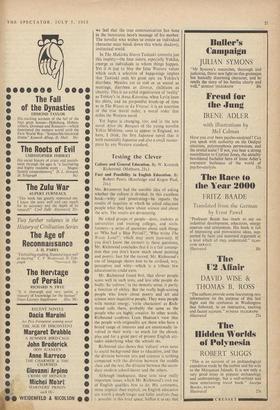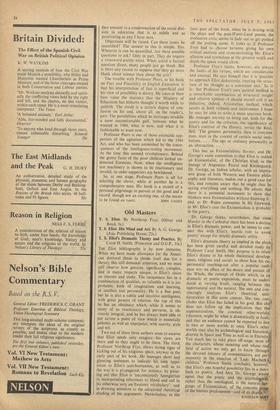Testing the Clever
Culture and General Education. By W. Kenneth
• Richmond. (Methuen, 21s.)
MR. RICHMOND had the sensible idea of asking whether the culture is divided. In this excellent book—witty and penetrating—he reports the results of inquiries in which he asked educated people what they knew about science and about the arts. The results are devastating.
He asked groups of people—dons, students at universities and training colleges, and sixth- formers—a series of questions about such things as 'Who had a Blue Period?', 'Who wrote The Waste Land?'; which may seem faux-naïf. If you don't know the answers to these questions, Mr. Richmond concludes that it is a fair assump- tion that you don't know much about painting and poetry. Just for the record, Mr. Richmond's use of language shows him to be civilised, wry, perceptive and witty—which is a tribute few educationists could earn.
Mr. Richmond found first, that clever people score well in such tests, and less able people do badly. So 'culture,' in the demotic sense, is partly a function of ability. But the really high-scoring people who knew about poetry and art and science were inquisitive people. They were people with mental energy, 'virile characters' as Rich- mond calls them, probably the same as the people who are highly creative. In other words, Richmond confirms 'Liam Hudson's view that the people with originality are those who have a broad range of interests and are emotionally in- volved in their work—so much for the eleven- plus and for a great part of present English atti- tudes underlying what the schools do.
Richmond also shows that 'culture' owes more to social background than to education, and that the division between arts and sciences is nothing compared with the division between the middle class and the rest, the division between the secon- dary modem school-leaver and the others.
Although inadequate, these• tests raise really important issues, which Mr. Richmond's own use of English qualifies him to do: His comments, more implicit than explicit, on English education are worth a much longer and fuller analysis thap i: possible in this brief space. Suffice it to say that
they amount to a condemnation of the social divi- sion in education that is as subtle and as penetrating as any I have seen.
Objections will be raised. Can these issues be quantified? The answer to this is simple. Yes. Whatever is can be quantified. Are these sensible questions to ask? Only in part. They do require a crossword-puzzle mind. When asked a factual question direct, many people just go blank. But is there any reason to suppose that' they go more blank about science than about the arts?
The trouble with Professor Peers; in his book on Fact and Possibility in English Education, is that his interpretation of fact is superficial and his view of possibility is dreary. He takes at their face value the statistics that the Ministry of Education has hitherto thought it worth while to publish. The result is a certain degree of con- fusion on his and, above all, on the reader's, part. The possibilities which he envisages straddle a most uncomfortable gulf, between what he wanted in 1944, what is now, and what it is fashionable to want now.
- Professor Peers is one of those estimable sup- porters of the agitation which led to the 1944 Act, and who has been astonished by the conse- quences of the intelligence-testing movement. At the time this seemed revolutionary. Behind the grimy faces of the poor children lurked un- detected Einsteins. Now, when the intelligence test machinery is shown to be reactionary and invalid, its older supporters are bewildered.
So, at one stage, Professor Peers is all for selecting the clever, while at another he is a comprehensive man. His book is a record of a personal pilgrimage in pursuit of the good and a record, though not an exciting one, of the mazes







































 Previous page
Previous page